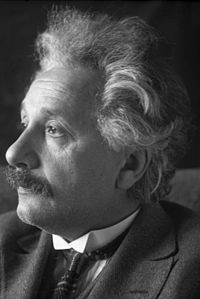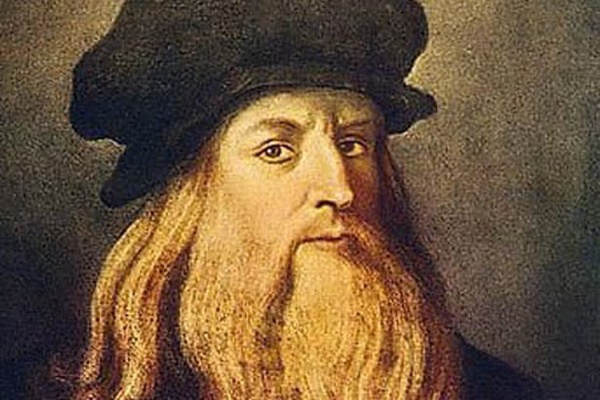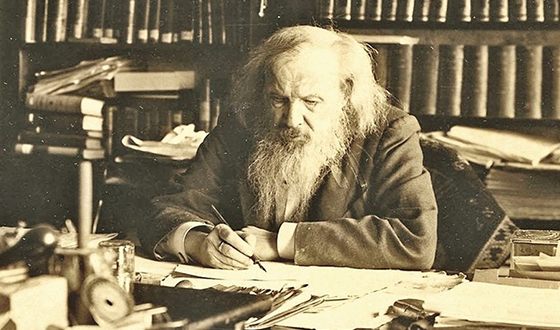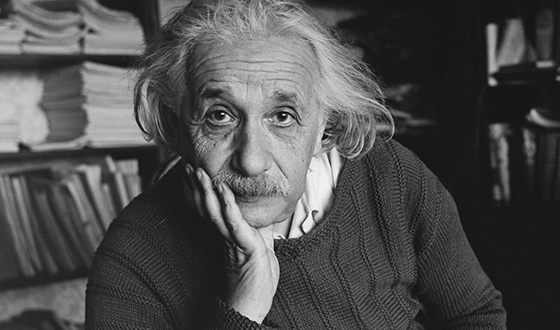Albert Einstein
 Albert Einstein, March 14, 1879, Ulm, Württemberg, Germany – April 18, 1955, Princeton, New Jersey, USA) – theoretical physicist, one of the founders of modern theoretical physics, 1921 Nobel Prize in Physics, public figure and humanist. He lived in Germany (1879–1893, 1914–1933), Switzerland (1893–1914) and the USA (1933–1955). Honorary Doctor of about 20 leading universities in the world, a member of many Academies of Sciences, including a foreign honorary member of the USSR Academy of Sciences (1926).
Albert Einstein, March 14, 1879, Ulm, Württemberg, Germany – April 18, 1955, Princeton, New Jersey, USA) – theoretical physicist, one of the founders of modern theoretical physics, 1921 Nobel Prize in Physics, public figure and humanist. He lived in Germany (1879–1893, 1914–1933), Switzerland (1893–1914) and the USA (1933–1955). Honorary Doctor of about 20 leading universities in the world, a member of many Academies of Sciences, including a foreign honorary member of the USSR Academy of Sciences (1926).
Einstein is the author of more than 300 scientific works in physics, as well as about 150 books and articles in the field of history and philosophy of science, journalism, etc. He developed several significant physical theories:
Special Theory of Relativity (1905)
Monument in Ulm on the site of the house where Einstein was born
Albert Einstein was born on March 14, 1879 in the southern German city of Ulm, in a poor Jewish family. His parents were married three years before his son was born on August 8, 1876. His father, Hermann Einstein (1847-1902), was at that time co-owner of a small enterprise for the production of feather padding for mattresses and featherbeds. His mother, Paulina Einstein (nee Koch, 1858–1920), came from the family of the wealthy corn dealer Julius Derzbacher (in 1842 changed his name to Koch) and Yette Bernheimer. In the summer of 1880, the family moved to Munich, where Hermann Einstein and his brother Jacob founded a small electrical equipment trading company. In Munich, the younger sister Albert Maria was born (Maya, 1881-1951).
Albert Einstein received his primary education at a local Catholic school. About 12 years old, he experienced a state of deep religiosity, but soon reading popular science books made him a free-thinker and forever gave rise to skepticism about authorities. From childhood impressions, Einstein later recalled as the strongest: the compass, Echlid’s “Principles” and (about 1889) Immanuel Kant’s “Critique of the Pure Reason”. In addition, at the initiative of his mother, he began playing the violin at the age of six. His passion for music remained with Einstein throughout his life. Already being in the United States in Princeton, in 1934, Albert Einstein gave a charity concert, where he played Mozart on the violin in favor of scholars and cultural figures who had emigrated from Nazi Germany.
In its framework – the law of the relationship of mass and energy: E = mc2.
General Theory of Relativity (1907–1916).
Quantum theory of photoelectric effect and heat capacity.
Bose – Einstein quantum statistics.
Statistical theory of Brownian motion, which laid the foundations of the theory of fluctuations.
Theory of induced radiation.
Theory of light scattering by thermodynamic fluctuations in a medium
He also predicted “quantum teleportation” and the Einstein-de Haas gyromagnetic effect. From 1933 he worked on the problems of cosmology and the unified field theory. He actively opposed war, against the use of nuclear weapons, for humanism, respect for human rights, mutual understanding between nations.
Einstein played a decisive role in the popularization and introduction of new physical concepts and theories into scientific circulation. First of all, this refers to the revision of the understanding of the physical essence of space and time and to the construction of a new theory of gravity instead of Newtonian. Einstein also, together with Planck, laid the foundations of quantum theory. These concepts, repeatedly confirmed by experiments, form the foundation of modern physics.
In the gymnasium, he was not among the first students (with the exception of mathematics and Latin). The ingrained system of mechanical memorization of material by students (which, he believed, harms the very spirit of learning and creative thinking), as well as the authoritarian attitude of teachers to students caused Albert Einstein to reject, so he often argued with his teachers.
In 1894, the Einsteins moved from Munich to the Italian city of Pavia, near Milan, where the brothers Hermann and Jacob transferred their company. Albert himself stayed with relatives in Munich for some time to complete all six classes of the gymnasium. So without receiving a certificate of maturity, in 1895 he joined his family in Pavia.
In the fall of 1895, Albert Einstein arrived in Switzerland to pass the entrance exams to the Higher Technical School (Polytechnic) in Zurich and become a teacher of physics. Having brilliantly proved himself in the math exam, at the same time he failed the examinations in botany and French, which prevented him from enrolling in the Zurich Polytechnic.



